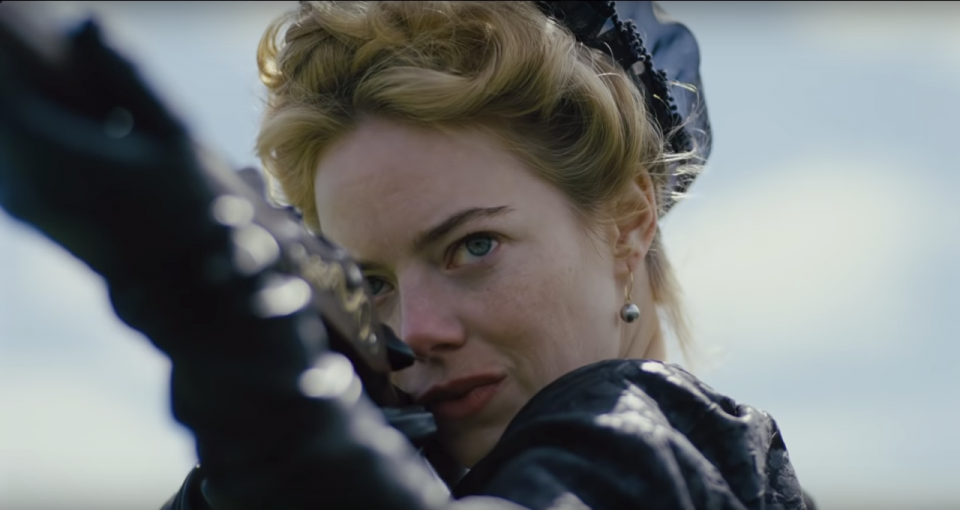Pop Stuff: Women Behaving Badly
This year’s New York Film Festival selection had a good deal to say about the heroine and how she is seen and heard in this shifting world order
The New York Film Festival has drawn to a close, showcasing some of the year’s best films from Cannes, Venice and Toronto and handpicking others for their World Premieres. A glimpse into the minds of auteur directors, celebrated writers, rising star filmmakers and actors and the projects that compel them, the festival is a societal barometer, a temperature taking of a global collective psyche. As such, in its 56th year, on the heels of the anniversary of a #MeToo movement that began with the downfall of a man synonymous with movies, the selection had good deal to say about the heroine and how she is seen and heard in this shifting world order. With patriarchal conventions called into question, she resists conforming to an ideal or stereotype. Liberated, she is loud, powerful and messy.
NYFF opened with Yorgos Lanthimos’ The Favourite which took the Grand Jury Prize at Venice this year. Ostensibly a period piece, set in the court of Queen Anne in 18th century England, the story re-imagines the behind the scenes drama between the monarch and two ladies-in-waiting at her court; cousins vying for her attention. Greek director Lanthimos who is perhaps best known for challenging societal norms, turns the conventional love triangle on its head. Whilst the men are mere props, the seat of power in this world rests with the women, played by Oliva Colman, Emma Stone and Rachel Weisz. Each is a force to be reckoned with, unrelenting in pursuit of desires which tend to the selfish, reckless, ruthless and murderous. Through biting satire, the film depicts the fate of an entire nation resting on the urges of the Queen and her courtesans. The power crazed leader has been male territory on screen, yet here the men prance around court in their high heels and wigs serving as eye candy or side dish but certainly not the main course.
If Lanthimos has women at their ugliest and most brutal holding a screen, American director Alex Ross Perry takes it a step further in his feature, Her Smell which made its world outing at the festival. Produced by Elizabeth Moss, who also plays the lead as a strung out ”˜90s indie rock star, it is another fine example of Moss pushing the boundaries of how we perceive women in life and on screen. The film is conceived in five acts and we spend the first half watching Moss’s character, Becky, tailspin in a spiral of drug addled self-destruction. A physical and emotional mess who repeatedly compromises her child, her family and her bandmates, Becky is so monstrous that her descent is a hard watch. Yet, like a car crash, she’s harder to turn away from. Moss is every bit the unhinged anti-hero that has been the stuff of male movie lore from Al Pacino’s Dog Day Afternoon to Ryan Gosling’s Drive. The story of the selfish artist, whose sins we forgive in bowing to their genius has long been a male narrative. In Her Smell brilliant women behaving badly are equally captivating and defensible.
In another much needed refashioning, the multi-faceted young actor Paul Dano tackles the relationship drama in his directorial debut and Cannes Critics Prize winning film Wildlife. Based on a novel and adapted for the screen with his partner Zoe Kazan, Wildlife takes place in 1960s America, setting the chaotic disintegration of a marriage against the placid beauty of the Montana mountains. Jake Gyllenhaal and Carey Mulligan play a couple at their tipping point as their teenage son is caught in the crossfire. It is Mulligan, however, who steals the show, making one quietly shocking decision after another in her quest to find an identity that has been simmering under years of home cooking and encouraging smiles. Her choices go from noble, to deceptive, to ultimately immoral in a captivating scene where her son looks on as she seduces an older man. Women on screen are habitually one dimensional archetypes from nurturer to bunny-boiler, but Mulligan breaks the mold; enchanting while flawed.
Cinematic icons have doubtless evolved with the march of equality, giving us an arsenal of strong female characters. But these films make another leap. With more hard won rights women shoulder a heavier burden of responsibility. Female characters and their creators bear the onus of setting an example for a generation of strong, confident women. But men, on and off screen, have never had to inhabit their identity, power or talent under the same moral scrutiny. Of course we need female heroes but we also need to discard the yardstick that measures the sexes on different terms and relieve women of the burden of perfection.
Recent events are a clear indicator that the female voice is vilified when it’s loud, belligerent or defiant while the male voice is encouraged; the louder the braver. This is why Serena Williams is excoriated on center court for the same transgressions which are often winked away in Men’s tennis. It is why Christine Blasey Ford is at pains to be a picture of restraint while Brett Kavanaugh can rage, weep and hurl insults and why Tanushree Dutta was made a Bollywood outcast years before she was finally heard. Female anger is hysteria and male anger is power and for this to shift it must shift in the stories we tell. Ultimate freedom lies in women having the freedom to be flawed, to behave badly and still leave room for admiration. I’m hopeful, that’s what these films are signaling; that the age of the female anti-hero is upon us.
Soleil Nathwani is a New York-based Culture Writer and Film Critic. A former Film Executive and Hedge Fund COO, Soleil hails from London and Mumbai. Twitter: @soleilnathwani




